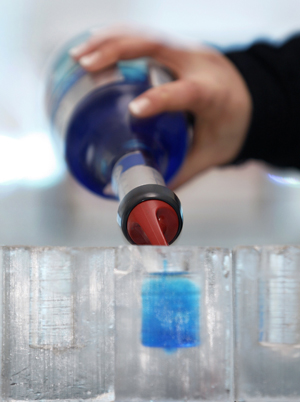|

|
|
A bartender pours alcohol into an ice glass at the Ice Hotel in Sainte-Catherine-de-la-Jacques-Cartier, Quebec January 31, 2008.[Xinhua/Reuters File Photo] |
Drinking Alcohol may delay childbearing for women but has little or no effect on men, according to a new study.
The researchers at the Washington University School of Medicine analyzed data from two groups of Australian twins born between 1893-1964 (3,634 female and 1,880 male twins) and between 1964-1971 (3,381 female and 2,748 male twins).
The study compared women's and men's lifetime history of alcohol dependence and their age when they had their first child.
The results showed that alcohol dependence can cause reproductive dysfunctions for both teen and adult females, the researchers said in a journal release Xinhua obtained Thursday.
The study is to be published in the November print issue of the journal Alcoholism: Clinical and Experimental Research.
The finding that alcohol dependence has more reproduction- related impact on women than on men may be because women reach higher blood alcohol concentrations than men while consuming similar amounts of alcohol, the researchers suggested.
"Reproductive dysfunctions include a range of menstrual disorders, sexual dysfunctions, and pregnancy complications that include spontaneous abortion or miscarriage. Teenagers who drink tend to have disruptions in their menstrual cycle as well as unplanned pregnancies," said corresponding author Mary Waldron, assistant professor of psychiatry at Washington University School of Medicine.
"To our knowledge, this is the first study to examine alcohol's effects on reproductive onset across reproductive development," he said.
"Most previous research has examined risks to teens or adults but not both. Our findings highlight a risk associated with AD (alcohol dependence) in women that is not widely recognized -- a risk that has assumed increasing importance given the increased rates of alcohol misuse by women and particularly young women," Waldron said.
"Young women who drink alcohol may want to consider the longer-term consequences for later childbearing," Waldron warned.
"If drinking continues or increases to levels of problem use, their ability and/or opportunity to have children may be impaired.
(Xinhua News Agency August 22,2008)